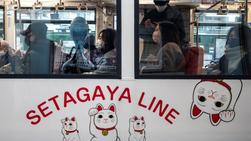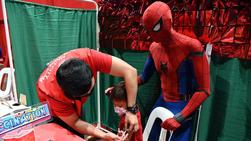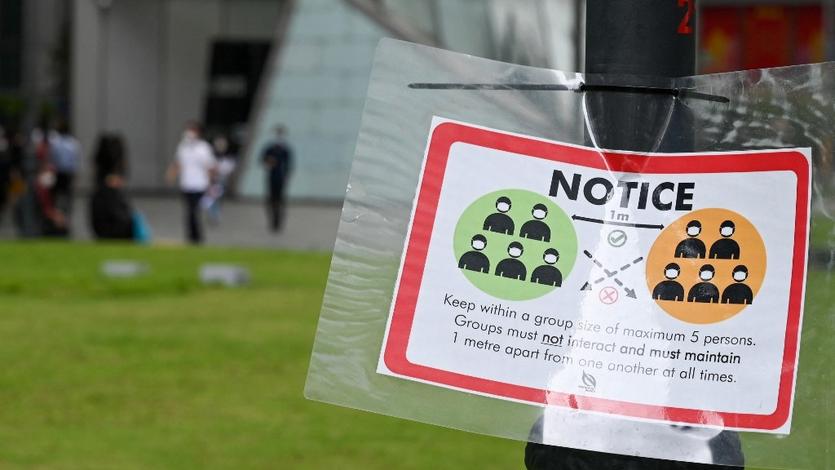 Commuters wearing face masks wait for their trains at a subway station in Seoul, South Korea on Feb 23, 2022. (AHN YOUNG-JOON / AP)
Commuters wearing face masks wait for their trains at a subway station in Seoul, South Korea on Feb 23, 2022. (AHN YOUNG-JOON / AP)
TOKYO / HANOI / SINGAPORE / PHNOM PENH / SEOUL / KUALA LUMPUR / MANILA - Concerns mounted here over South Korea's decision to lift all anti-COVID-19 measures as the "non-scientific" decision can give wrong signals that the pandemic is over.
A week earlier, the South Korean government lifted all social-distancing guidelines, including a business curfew and a cap on private gatherings, except for mask mandate.
From Monday, people are allowed to have food indoors in the multi-use facilities such as religious and sports venues, movie theaters, concert halls, private cram schools and shops.
"The (South) Korean government's such measures are not appropriate as it only took into account easing economic damages. Health damages are still running high given the daily caseload of around 100,000 and the daily number of deaths between 100 and 200," Dr. Choi Jae-wook, a professor of preventive medicine at Korea University College of Medicine, told Xinhua.
The country reported 34,370 more COVID-19 cases as of midnight Sunday compared to 24 hours ago, data from the Korea Disease Control and Prevention Agency (KDCA) showed Monday.
The figure was down from 64,725 in the previous day due to fewer virus tests over the weekend and also lower than 47,730 tallied a week earlier.
Although the Omicron-driven peak may seem to have eased, experts said the lifting of all anti-virus rules can mislead people to think that the pandemic have come to a complete end.
"The non-scientific, political decision can lead people to misconceive that they will no longer need to follow social-distancing rules or wear mask. People can also be mistaken about the still serious situations and think that there is no problem," said Choi.
Son Young-rae, an official with the Ministry of Health and Welfare, told a press briefing last Monday that the lifting of the social-distancing guidelines does not represent an end to the pandemic, asking people to look after personal hygiene well.
 A boy receives a dose of the Sinovac coronavirus vaccine at a health center in Phnom Penh on Nov 1, 2021, as Cambodia begins vaccinating children from aged five and older. (TANG CHHIN SOTHY / AFP)
A boy receives a dose of the Sinovac coronavirus vaccine at a health center in Phnom Penh on Nov 1, 2021, as Cambodia begins vaccinating children from aged five and older. (TANG CHHIN SOTHY / AFP)
Cambodia
Cambodian Prime Minister Samdech Techo Hun Sen on Sunday called on the public to get their booster doses of COVID-19 vaccines, saying that the booster jabs are necessary to strengthen their immunity against the highly contagious disease.
The southeast Asian nation launched a national vaccination drive against the disease in February 2021, with China being the key vaccine supplier.
So far, 14.88 million people, or 93 percent of the country's total population of 16 million, have obtained at least one shot, the Health Ministry said, adding that 14.14 million, or 88 percent, have been fully vaccinated with two required doses.
Also, some 8.22 million, or 51 percent, have got a third dose, and 1.36 million, or 8.5 percent, have had a fourth dose.
Hun Sen said all eligible Cambodians must receive at least three vaccine shots to strengthen their immunity and advised the health authorities to focus their vaccination campaign on garment factory employees, construction workers, market vendors and students.
The prime minister said that thanks to the effectiveness of vaccines, Cambodia did not see any sign of COVID-19 resurgence after the kingdom celebrated its traditional new year from April 14 to 16, during which some 4.6 million tourists traveled nationwide.
 People wearing face masks due to COVID-19 travel on a Setagaya Line tram decorated with "maneki-neko" or beckoning cat statue images in Tokyo on Jan 30, 2022. (PHILIP FONG / AFP)
People wearing face masks due to COVID-19 travel on a Setagaya Line tram decorated with "maneki-neko" or beckoning cat statue images in Tokyo on Jan 30, 2022. (PHILIP FONG / AFP)
Japan
An experimental treatment from Shionogi & Co Ltd has shown rapid clearance of the virus that causes COVID-19, according to new data, the Japanese drug maker said on Sunday.
The pill, S-217622, "demonstrated rapid clearance of the infectious SARS-CoV-2 virus", Shionogi said in a statement, citing Phase-2b results from the Phase II/III clinical trial of the drug.
The company has global aspirations for the antiviral pill, which is now being evaluated by Japanese regulators.
The findings released on Sunday also showed "there was no significant difference in total score of 12 COVID-19 symptoms between treatment arms" although the drug showed improvement in a composite score of five "respiratory and feverish" symptoms, Shionogi said.
The drugmaker said in March it would launch a global Phase III trial worldwide for the drug with US government support, and Chief Executive Isao Teshirogi has said production could reach 10 million doses a year.
Malaysia
Malaysia reported 4,006 new COVID-19 infections as of midnight Sunday, bringing the national total to 4,431,073, according to the health ministry.
There are seven new imported cases and 3,999 local transmissions, data released on the ministry's website showed.
A further eight deaths have been reported, bringing the death toll to 35,499.
 A child receives the Pfizer-BioNtech COVID-19 vaccine for children aged 5-11 as a performer dressed as superhero character Spider-Man looks on at a gym in San Juan City, suburban Manila on Feb 7, 2022. (TED ALJIBE / AFP)
A child receives the Pfizer-BioNtech COVID-19 vaccine for children aged 5-11 as a performer dressed as superhero character Spider-Man looks on at a gym in San Juan City, suburban Manila on Feb 7, 2022. (TED ALJIBE / AFP)
Philippines
The Philippines on Monday started giving second COVID-19 booster doses for immunocompromised adults, joining a growing number Asian countries offering a fourth vaccine shot.
Nearly 61 percent of the Philippines' 110 million population have been vaccinated, while nearly 13 million people have received first booster doses, government data show.
Of 690,000 people deemed most vulnerable, between 7,000 and 13,000 have been initially targeted for the second round of boosters, to increase protection against COVID-19 and its variants.
"Because of increasing vaccination coverage, while COVID-19 is still there, in the near future we can consider this as an endemic disease," Health Secretary Francisco Duque told a public forum.
The Philippines has been cautious with its reopening, despite efforts to revive an economy that contracted more than 9 percent in 2020, having been one of Asia's fastest growing before the pandemic.
 A notice warning people not to gather in groups larger than five persons as part of restrictions to hald the spread of the coronavirus is displayed at Raffles Place financial business district in Singapore on Jan 4, 2022. (ROSLAN RAHMAN / AFP)
A notice warning people not to gather in groups larger than five persons as part of restrictions to hald the spread of the coronavirus is displayed at Raffles Place financial business district in Singapore on Jan 4, 2022. (ROSLAN RAHMAN / AFP)
Singapore
Singapore reported 2,044 new cases of COVID-19 on Sunday, bringing the total tally to 1,182,168.
Of the new cases, 259 cases were detected through PCR (polymerase chain reaction) tests and 1,785 through ART (antigen rapid test) tests, according to statistics released by the Ministry of Health.
Vietnam
Vietnam reported 8,813 new COVID-19 cases on Sunday, down by 1,553 from Saturday, according to its Ministry of Health.
Among the new infections, one was imported and the rest were domestically transmitted in 60 provinces and cities.


